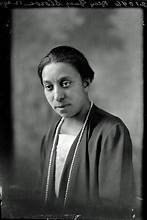“Because boundaried spaces don’t build themselves—someone has to brave the silence first.”[WeSurviveAbuse.com] Most people will tell you Lucy Diggs S
“Because boundaried spaces don’t build themselves—someone has to brave the silence first.”
[WeSurviveAbuse.com]
Most people will tell you Lucy Diggs Slowe was a tennis champion.
That she was the first Dean of Women at Howard University.
That she co-founded Alpha Kappa Alpha.
That she broke barriers for Black women in academia.
All of that is true.
But it is far from the whole truth.
Lucy Diggs Slowe was protecting Black girls on college campuses before the world ever knew to call it “sexual harassment.”
She was building sanctuary in systems designed to erase us.
And she was loving another Black woman—quietly, intentionally, and fully—in a time when such a thing had to be done in secret.
🛡️ She Knew What Was Happening. And She Refused to Look Away.
In 1922, Lucy Diggs Slowe became the first Black woman to serve as Dean of Women at Howard University—
a historic first, and a courageous act of service.
At a time when young Black women on campus were navigating sexism, racism, and isolation, Slowe stood in the gap. She:
Established women’s dormitories and leadership programs that gave students both privacy and voice.
Created new channels for young women to seek guidance and protection.
Advocated for policies that recognized women’s dignity and inclusion in university decision-making.
Challenged faculty misconduct and pressed for accountability, even when it risked her own standing.
Her files record at least one early documented case of sexual harassment of a student—a moment when she dared to name what others preferred to ignore.
Slowe understood the cost of truth-telling.
She knew that “education” without safety or respect was not liberation—it was exploitation.
So she fought to make Howard a place where learning could coexist with dignity, autonomy, and safety.
Not for applause.
Not for power’s sake.
But because her students deserved better—and she refused to let them stand unprotected.
💬 “The right of every woman student to develop freely, without fear or favor, must be defended
—not only in principle, but in practice.”
—Lucy Diggs Slowe
🏡 She Protected Her Own Love, Too
In 1912, Lucy met Mary P. Burrill, a gifted playwright and educator. They would go on to share their lives—and a home—for over 25 years.
But they had to hide their relationship from the public.
A same-sex couple.
Two professional, brilliant Black women.
Navigating racism, sexism, and homophobia while fighting for the liberation of others.
When Slowe was appointed Dean, the two women moved into a home in the Brookland neighborhood of D.C., known today as the Slowe-Burrill House, listed on the National Register of Historic Places in 2020.
They lived and loved there for 15 years—out of view, but never out of integrity.
🧠 Why Her Truth Matters—Especially Now
Lucy Diggs Slowe’s legacy of protection, advocacy, and love must be remembered in full:
She stood for Black girls’ safety in schools.
She shielded students from sexual exploitation by those in power.
She maintained a romantic partnership with another woman for over two decades.
She lived fully in her calling, courage, and quiet rebellion.
We will not let history erase the parts of her that were inconvenient to patriarchy, racism, or respectability.
🪶 Black girls deserve to learn without being hunted.
Black women deserve to lead without being harassed.
Black women who love other women deserve to be remembered with honor.
🌸 Say Her Name: Lucy Diggs Slowe
Protector. Pioneer. Truth-Teller. Woman Who Loved a Woman.
A name every girl should know.
A name every institution should answer to.
📚 Sources:
Shaw, Stephanie J. What a Woman Ought to Be and to Do: Black Professional Women Workers During the Jim Crow Era. University of Chicago Press, 1996.
Gasman, Marybeth. “Swept Under the Rug? A Historiography of Gender and Black Colleges.” American Educational Research Journal, vol. 44, no. 4, 2007, pp. 760–805.
Gregory, Sheila T. Black Women in the Academy: The Secrets to Success and Achievement. University Press of America, 1999.
National Park Service. National Register of Historic Places Registration Form: Slowe-Burrill House, 2020.